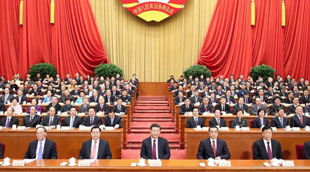Whether or not these prosecutions succeed, for now we can no longer celebrate the SEC’s disclosure rule, or the United States’ renewed support in creating a global standard of transparency for the extractive industries. With Donald Trump’s presidency and a Republican-controlled Congress, the SEC rule was immediately vacated under the Congressional Review Act, an obscure law that had been used only once before.
Trump’s frequently racist and misogynist campaign promised to “drain the swamp” of corruption in Washington politics. But congressional Republicans’ decision to scrap the SEC rule, which Trump quickly signed into law, was an act of pure cynicism that helps perpetuate the “corrupt” system that Trump claims he ran against.
After the oil and gas industry failed to block Section 1504 through legal action, it appealed to its friends in Congress for help. And the arguments used by its congressional proxies would be risible had the consequences not been so tragic. Senator James Inhofe, a notorious climate-change denier who has received more than $3 million in campaign contributions from the fossil-fuel industry, led the charge: the disclosure rule was an imposition from the Obama era that would be too costly to implement and add needless bureaucratic red tape. No mention was made of the costs borne by citizens when their national wealth is sold off through dirty deals or by investors when corruption leads to prosecutions and massive fines.
To fulfill the Paris agreement, efforts to combat corruption and climate change must go hand in hand. Corruption, in the widest sense of the word, is the glue that holds the “system” together, that ensures that moneyed and powerful interests are free from rules that are meant to hold them in check. It is why governments that pledged to make large reductions in greenhouse-gas emissions have been unable to meet their commitments.
Shell, Exxon, and most other major oil and gas companies knew decades ago that their products were fueling climate change. But instead of acting on that knowledge, and changing their business model, they embarked on a massive campaign to deceive the public and lure policymakers into complacency. Not surprisingly, Shell is one of 47 major hydrocarbon producers now being investigated by the Filipino government for its role in contributing to human-rights violations stemming from climate change.
To sustain progress in the fight against climate change and corruption, environmental and anti-corruption movements will have to work together, and play to their respective strengths. If nothing else, Trump’s election, and the possibility of more populist victories in Europe this year, have given us a wake-up call.
****
Lili Fuhr heads the Ecology and Sustainable Development Department of the Heinrich Böll Foundation in Berlin. Simon Taylor is Co-Founder and Director of Global Witness and Co-Founder of the 2002 “Publish What You Pay” campaign for mandatory disclosure mechanisms in extractive industries.
****
Copyright: Project Syndicate, 2017.
www.project-syndicate.org
 The Independent Uganda: You get the Truth we Pay the Price
The Independent Uganda: You get the Truth we Pay the Price


